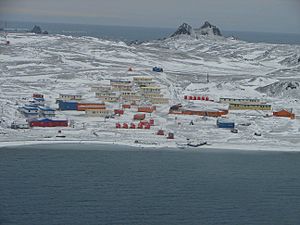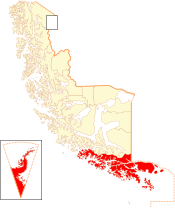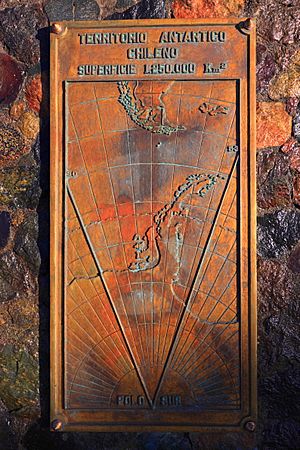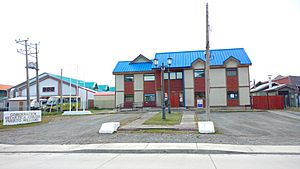Antártica Chilena Province facts for kids
Quick facts for kids
Antártica Chilena Province
Provincia Antártica Chilena
|
||
|---|---|---|

Base Presidente Eduardo Frei Montalva
|
||
|
||

Location in the Magallanes and Antártica Chilena Region
|
||
| Country | ||
| Region | ||
| Capital | Puerto Williams | |
| Communes | Cabo de Hornos, Antártica | |
| Government | ||
| • Type | Provincial | |
| Area | ||
| • Total | 1,265,853.7 km2 (488,748.8 sq mi) | |
| Population
(2012 Census)
|
||
| • Total | 1,792 | |
| • Density | 0.0014156/km2 (0.0036665/sq mi) | |
| • Urban | 1,952 | |
| • Rural | 440 | |
| Sex | ||
| • Men | 1,518 | |
| • Women | 874 | |
| Time zone | UTC-3 (CLST) | |
| • Summer (DST) | UTC-3 (CLST) | |
| Area code(s) | 61 | |
| Website | [1] | |
The Antártica Chilena Province (which means 'Chilean Antarctic Province' in Spanish) is the southernmost province in Chile. It's part of Chile's Magallanes and Antártica Chilena Region. The capital city is Puerto Williams.
This province includes the very southern tip of Tierra del Fuego, some islands like the Diego Ramírez Islands, and a part of Antarctica that Chile claims as its own. It is divided into two main areas called communes: Cabo de Hornos and Antártica. The Antártica commune is a large, wedge-shaped area in Antarctica that is not recognized by all countries.
The Antártica Chilena Province is huge, almost twice the size of all other Chilean provinces combined. However, it has the smallest population in Chile.
Contents
Communes of the Province
The Antártica Chilena Province is split into two main areas called communes. Think of them like big districts.
Cabo de Hornos Commune
This commune is located at the southern tip of South America. Its capital is Puerto Williams.
- It covers an area of about 14,146 square kilometers.
- In 2002, its population was 2,262 people. Most of these people (1,952) live in Puerto Williams.
- The commune is managed by a local government called a municipal council, led by an alcalde (mayor) who is elected every four years.
Antártica Commune
This commune covers the part of Antarctica that Chile claims.
- It is a very large area, about 1,250,000 square kilometers.
- In 2002, only 130 people lived here.
- It's important to know that many countries do not recognize Chile's claim over this part of Antarctica. You can learn more about this in the Antarctic territorial claims article.
The local government for Cabo de Hornos also manages the Antártica Commune. This makes it the only Chilean local government that looks after more than one commune.
Population and People
According to a census in 2002, the province had 2,392 people living there. Out of these, 1,518 were men and 874 were women.
- Most people (81.6%) lived in towns or cities.
- A smaller group (18.4%) lived in rural areas.
Even though it's the biggest province in Chile by land area, it has the fewest people. This means it's also the most spread out, with very few people per square kilometer. Between 1992 and 2002, the population grew by 23%.
Chile's Claim to Antarctica

The part of the province in South America is recognized internationally as part of Chile. However, the Antártica Commune, which is most of the province's area, is a disputed territory. This is the Chilean claim to Antarctica, stretching from south of the 60th parallel all the way to the South Pole.
The Antártica Commune has very few permanent residents. Most people there are scientists or staff at research stations from different countries. However, Chile maintains a small permanent civilian population at Villa Las Estrellas. This includes families with women and children, a small school, and even a bank. Chile does this to support its claim to the area. In 2002, the official population for this area was 130 people. This number does not include staff from non-Chilean bases.
Chile believes its claim to Antártica Chilena is very old, dating back to when Chile was first formed. This claim is based on historical agreements and land grants from the Spanish Empire.
Early History
People have lived in this area for a very long time. Scientists have found evidence of early human settlements. For example, the Yaghan people lived on the islands of this province. There are important old Yaghan sites, like the Bahia Wulaia Dome Middens at Wulaia Bay.
Recent History
Towns like Puerto Williams and Porvenir were started in the late 1800s. Many of the first settlers were immigrants from Europe, especially from the British Isles, Scandinavia, and former Yugoslavia. Sailors on cruise ships and fishing boats also came to the area. In the 20th century, the Chilean government encouraged people from central Chile to move here to help increase the small population.
See Also
 In Spanish: Provincia Antártica Chilena para niños
In Spanish: Provincia Antártica Chilena para niños
- Chilean Antarctic Territory
- Antártica (Commune)
- Territorial claims in Antarctica
- Argentine Antarctica and Tierra del Fuego Province
- British Antarctic Territory
- Antarctic Treaty System
- Antarctic Peninsula
- Ildefonso Islands
Images for kids
 | Precious Adams |
 | Lauren Anderson |
 | Janet Collins |




